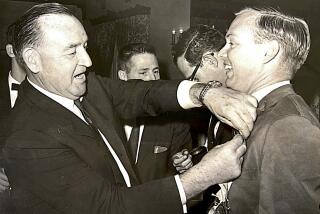Robert B. Carleson, 75; Pioneered Welfare Reform Under Reagan in California, U.S.
- Share via
Robert B. Carleson, who helped initiate major changes in the California welfare system in the early 1970s and implemented them as part of then-Gov. Ronald Reagan’s administration, has died. He was 75.
Carleson, of Alexandria, Va., who continued to focus on welfare reform initiatives as a special assistant to Reagan when he became president, died Friday in a Washington, D.C., hospital after a brief illness, said his wife, Susan.
Carleson was chief deputy director of the California Department of Public Works when Reagan tapped him to lead a task force in revising the state’s public assistance programs and reducing welfare spending.
Reagan then appointed Carleson director of social welfare for the state. In August 1971, the Legislature passed a compromise welfare reform bill that Reagan described as “the most comprehensive ... ever attempted any place in the United States.”
“Bob was one of several people who played an important role when Gov. Reagan and Bob Moretti, the [Democratic] speaker of the Assembly, hammered out the welfare reform bill in 1971,” said Lou Cannon, author of five books on Reagan.
“Carleson was obsessed with cracking down on [welfare] fraud, which wasn’t trivial. A number of Democrats, and actually Reagan himself, wanted to crack down on fraud” and also “raise the grants of the neediest Californians,” which had not been raised in many years.
“The final bill that was passed was ... a better bill than Clinton and the Republicans passed thirtysomething years later,” Cannon said, referring to the 1996 law President Clinton signed after bipartisan support in Congress resulted in sweeping changes to public aid programs.
Although declining welfare rolls were a national trend in the ‘70s, Cannon said, “a study by the Urban League showed that California’s rolls declined more than other states” after the state bill was passed.
“Bob was a key leader in Gov. Reagan’s effort to reform welfare, and as director of social welfare, he was the guy who had to do the hard work in the field to make sure that the governor’s reforms took hold,” said James Hall, who served as secretary of health and welfare and secretary of business and transportation during Reagan’s governorship.
Martin Anderson, who served as Reagan’s early White House domestic and economic policy advisor and has written six books on Reagan, said he once asked Carleson, “What did you guys do? California’s welfare rolls went down enormously and yet there was no screaming and yelling.
“He said, ‘We were accused of cutting people off the welfare rolls, but we didn’t do that. We carefully applied the law.’ The word spread around that, according to him, people began to understand if you wanted to do some gaming with this it didn’t work. You had to show that you were poor.”
And as the number of people on welfare decreased, Anderson said, “more money was available to give to those who were on welfare a significant increase.
“What he was saying was, let’s look at what the law says, apply it and if a person can’t take care of himself or herself they have every right to have welfare, and we’ll provide them with enough money so they can live comfortably and with dignity.”
In 1975, after serving two years as the U.S. commissioner of welfare, Carleson started a management consulting firm and continued to press for welfare reform.
He joined the Reagan White House as a special assistant to the president for policy development and was instrumental in shaping the Reagan welfare reforms contained in the Budget Reconciliation Act of 1981.
After Carleson left the White House, he consulted with governors on welfare reform and advised congressional leaders prior to the signing of the landmark 1996 federal welfare overhaul.
Born in Long Beach on Feb. 21, 1931, Carleson served as a Navy officer in the Korean War. After earning a degree in public administration at USC, he went into the field of city management.
He served as a public works administrator for Beverly Hills and in municipal positions in Claremont and Torrance. He also was the city manager of San Dimas and Pico Rivera before entering state government.
In recent years, Carleson founded and served as chairman and chief executive of the American Civil Rights Union, an organization that calls itself a conservative alternative to the American Civil Liberties Union.
In addition to his wife, Carleson is survived by three children from his former marriage, sons Eric and Mark and daughter Susan Klembeck; and five grandchildren.
Contributions may be sent to the Scouting Legal Defense Fund at www.defendscouting.com.
More to Read
Get the L.A. Times Politics newsletter
Deeply reported insights into legislation, politics and policy from Sacramento, Washington and beyond. In your inbox twice per week.
You may occasionally receive promotional content from the Los Angeles Times.










